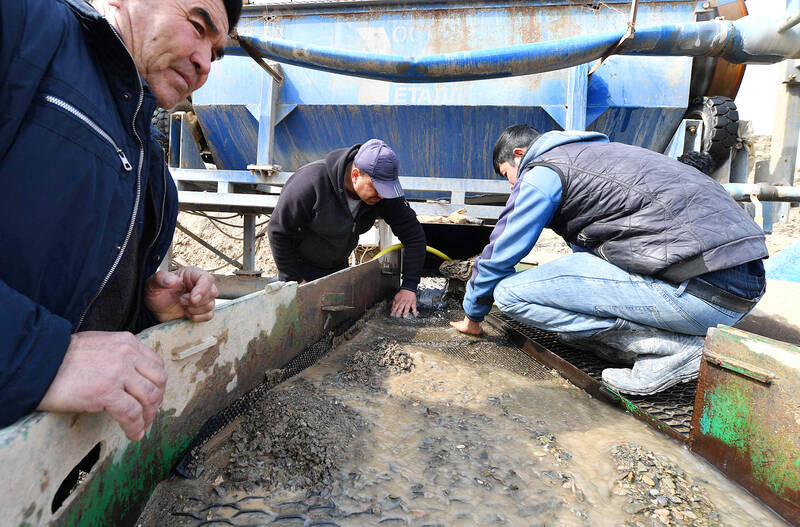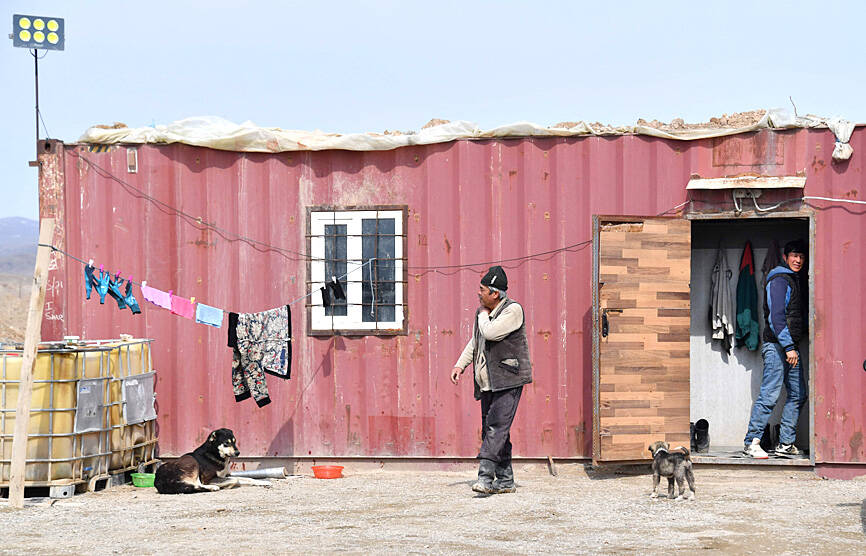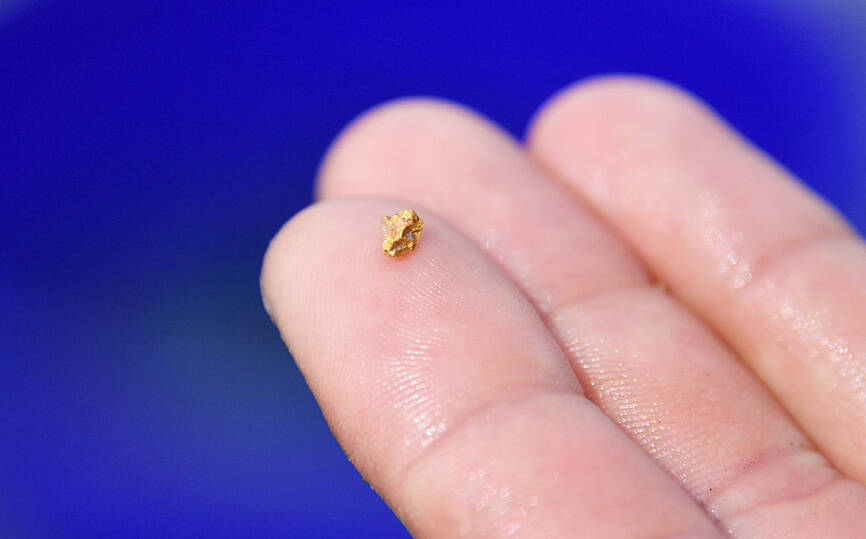Sifting through a grayish mixture of sand and pebble in the steppe of Uzbekistan, Khislat Ochilov was searching for gold.
He is one of hundreds of new prospectors trying to strike it rich in a modern-day gold rush in the Central Asian country, chock-full of the precious metal.
A right once preserved for state mining firms, recent regulatory changes designed to boost the economy mean anyone can hunt for gold.

Photo: AFP
Ochilov scanned the shiny flakes that appeared on his panning mat, submerged in a pool of water. Finally, he spotted a piece the size of a grain of rice.
“Not bad, though my record is 7g,” the 25-year-old said, while out in the Uzbek steppe, near the southwestern village of Soykechar.
Nearby, Sardor Mardiyev, 28, was hard at work digging through the earth in the vast Navoi Region, a district larger than Portugal.

Photo: AFP
He drives his excavator 12 hours a day, six days a week as part of a frenzy for the metal that officials hope will boost Uzbekistan’s output.
Last year, the country produced 110.8 tonnes of gold, putting it 10th place globally, and its central bank was the second-largest net seller in the world at about 25 tonnes, behind only Kazakhstan, World Gold Council data showed.
For Uzbek President Shavkat Mirziyoyev — who sees himself as a reformer opening up and liberalizing his country’s economy after years of isolation and centralization — it is not enough.

Photo: AFP
He has ordered gold production to be increased by 50 percent by 2030. The potential is there — only 20 percent of Uzbekistan’s subsoil has been explored to date.
Mirziyoyev, in power since 2016, has also called for gold bars weighing up to 1kg to be sold in the hopes of drawing more tourists to his landlocked Central Asian nation.
Zahit Khudaberdiyev, in his 30s, is among hundreds of entrepreneurs who have decided to try their luck since the regulation change. To join the gold rush he acquired the rights to a plot of land for three years at auction.
“Before 2019, we didn’t have the right to mine gold. Some did it anyway at the risk of death — it was dangerous,” Khudaberdiyev said.
His competition includes Kazakh and Chinese prospectors who secured neighboring plots.
If this one does not prove bountiful, he would look further afield, he said.
Behind Khudaberdiyev, trucks and diggers bustle with activity.
They churn up tonnes of rubble and can help scourers unearth a daily average of 12g to 15g, he said.
As he spoke, he had one eye glued to his phone, monitoring global gold prices.
This month, they climbed to a record high of US$2,200 per troy ounce (31.1g).
“The government decided to issue such plots for gold mining to provide work for the population,” he said.
The prospecting rush is providing an unexpected employment boon for a country where 20 percent of workers are forced to go abroad for employment, mainly to Russia.
Khudaberdiyev gave the example of his young employees, locals Ochilov and Mardiyev. Before he hired them, one was unemployed, the other a farm hand.
Now they earn 3 million to 4 million som US$237.88 to US$317.18 on average each month, Khudaberdiyev said — a decent salary for the region.
The new wave of gold miners are not allowed to do as they please with the gold they dig up. All of it must be funneled through the Uzbek central bank, which trades it for dollars on the global market.
The country’s growing economy depends on injections of foreign currency to support the national currency. The som has one of the lowest face values in the world, with US$1 worth 12,500 som.
In Soykechar, where farming remains a vital sector, not everyone is thrilled about the gold rush.
“Prospectors dig where we graze our cattle,” said Erkin Karshiev, a leading farmer in the region, about 500km southwest of the capital, Tashkent.
“Look how the last guys left everything,” the 66-year-old farmer said, motioning with frustration to holes a dozen meters deep.
Karshiev said he was “really afraid the animals will fall in,” but his multiple calls on the authorities to resolve the issue have thus far gone ignored.
“We only want one thing: for the gold miners to level the land by filling in the holes when they leave,” he said.

NEW IDENTITY: Known for its software, India has expanded into hardware, with its semiconductor industry growing from US$38bn in 2023 to US$45bn to US$50bn India on Saturday inaugurated its first semiconductor assembly and test facility, a milestone in the government’s push to reduce dependence on foreign chipmakers and stake a claim in a sector dominated by China. Indian Prime Minister Narendra Modi opened US firm Micron Technology Inc’s semiconductor assembly, test and packaging unit in his home state of Gujarat, hailing the “dawn of a new era” for India’s technology ambitions. “When young Indians look back in the future, they will see this decade as the turning point in our tech future,” Modi told the event, which was broadcast on his YouTube channel. The plant would convert

‘SEISMIC SHIFT’: The researcher forecast there would be about 1.1 billion mobile shipments this year, down from 1.26 billion the prior year and erasing years of gains The global smartphone market is expected to contract 12.9 percent this year due to the unprecedented memorychip shortage, marking “a crisis like no other,” researcher International Data Corp (IDC) said. The new forecast, a dramatic revision down from earlier estimates, gives the latest accounting of the ongoing memory crunch that is affecting every corner of the electronics industry. The demand for advanced memory to power artificial intelligence (AI) tasks has drained global supply until well into next year and jeopardizes the business model of many smartphone makers. IDC forecast about 1.1 billion mobile shipments this year, down from 1.26 billion the prior

People stand in a Pokemon store in Tokyo on Thursday. One of the world highest-grossing franchises is celebrated its 30th anniversary yesterday.

Zimbabwe’s ban on raw lithium exports is forcing Chinese miners to rethink their strategy, speeding up plans to process the metal locally instead of shipping it to China’s vast rechargeable battery industry. The country is Africa’s largest lithium producer and has one of the world’s largest reserves, according to the US Geological Survey (USGS). Zimbabwe already banned the export of lithium ore in 2022 and last year announced it would halt exports of lithium concentrates from January next year. However, on Wednesday it imposed the ban with immediate effect, leaving unclear what the lithium mining sector would do in the